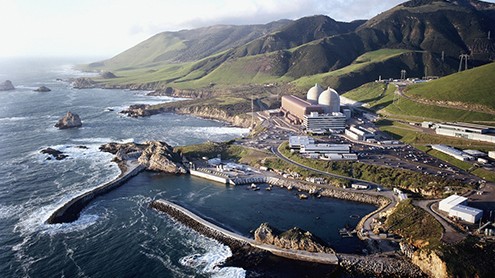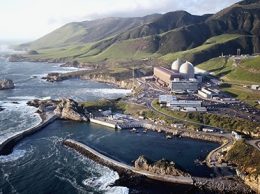PG&E pact will mitigate Diablo Canyon closure

The Diablo Canyon Power Plant sits on prime coastal property near Avila Beach.
San Luis Obispo County got an early Christmas present of sorts on Nov. 28.
That’s when PG&E agreed to set up a $75 million fund plus an estimated $50 million to $70 million in additional payments to mitigate the impact of the closing of the Diablo Canyon nuclear plant by 2025.
The agreement includes funds for schools and other local agencies to absorb the economic body blow that will result when Diablo Canyon’s estimated 1,500 well-paying jobs, plus contract services and direct spending, finally wind down.
The wind down will extend well beyond the closing date. Decommissioning and environmental cleanup, preparations for fuel storage and other items will keep some operations at the plant going for an estimated 15-20 years beyond the 2025 closing.
Cities and the county will share in the mitigation fund with the bulk going to schools. There is a separate fund for employee retention and severance programs but the impact is hard to fathom. Diablo Canyon payrolls alone account for 1.5 to 2 percent of the entire county’s payroll, according to Beacon Economics.
Politically, the revised settlement is a victory for 3rd District Supervisor Adam Hill, who has championed the need for the county to be made whole as much as possible from the plant closing.
The best path forward for SLO County in the wake of the Diablo Canyon closing is to leverage increased funding for education, plus the resources of Cal Poly San Luis Obispo to create a much bigger footprint for its nascent but fast-growing technology sector.
That’s the only place jobs with incomes that could possibly replace the $100,000-plus per year salaries of Diablo Canyon workers will be found.
Odds are the Trump administration will be in no rush to close Diablo Canyon any earlier than its current 2025 plan and at least for now the plant is still providing roughly 9 percent of California’s power on a daily basis.
While some environmental groups are pressing for the plant to close even sooner, Diablo Canyon is key to reducing the state’s carbon footprint until more sources of alternative fuel can be developed.
Relief for small businesses
A federal court in Texas handed employers in California and elsewhere a nicely wrapped present when it suspended the new overtime rules for exempt employees.
The court’s temporary stay means that it’s unlikely that a cornerstone of what we dubbed the Obama administration’s war on small business will ever come to pass.
For California, relief is relatively small as the new salary level for exempt employees will rise with the minimum wage on Jan. 1. The new minimum exempt salary will rise to $43,850 as the state’s minimum wage is raised to $10.50 per hour from $10 per hour.
That’s just a few thousand dollars below the proposed federal standard but it’s still some relief for employers and, particularly, small business owners.











